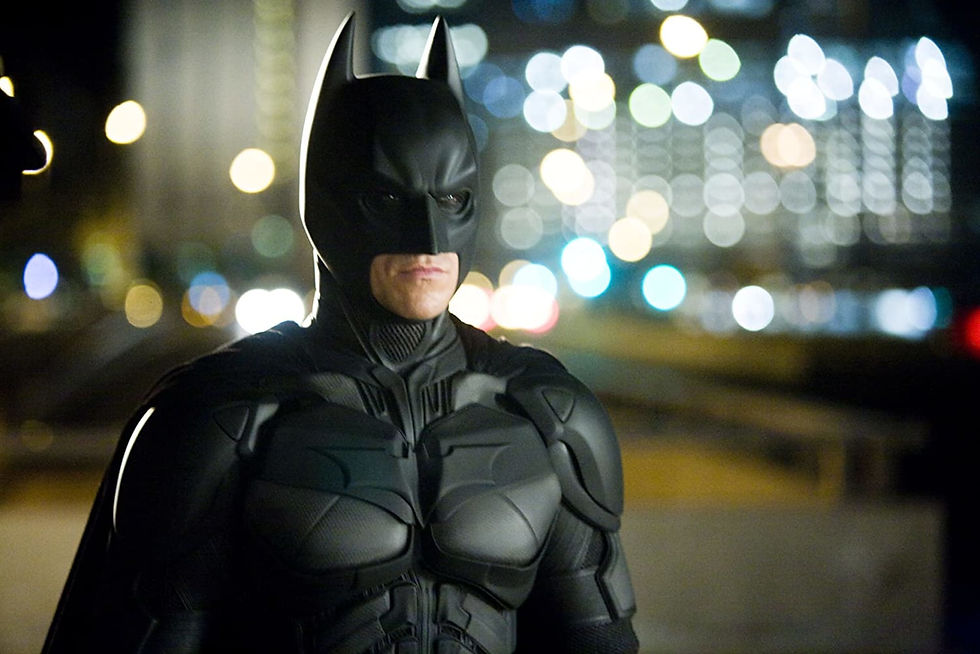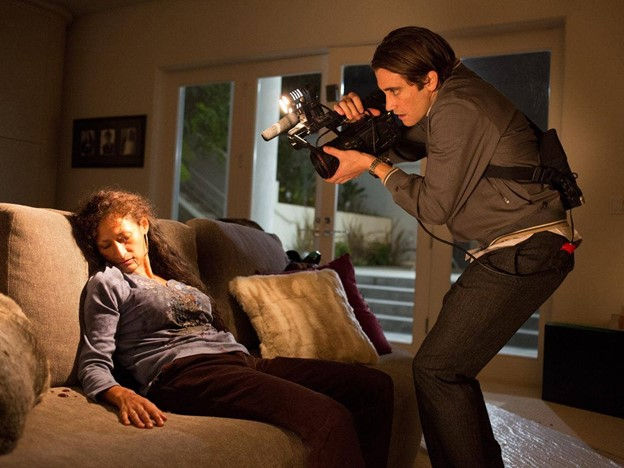Why The Dark Knight stands the test of time
- Hasan Ghafoor

- Jan 27, 2021
- 7 min read
Updated: May 24, 2021

I love superhero movies, but I'll be the first to admit that they don't always age well.
Most are churned out, admired for a bit, then forgotten in three months when the next movies arrives. They might be idly watched by movie-marathoners or diehard fans once in a while, but superhero movies are not a genre that are known for their longevity. The most clear exception of this is The Dark Knight. Despite the The Dark Knight being one of my favourite movies, I rarely saw past its caped crusaders and gun wielding clowns. Now, however, I see why this film has been revered for so long as a masterpiece of the superhero genre: the battle between Batman and the Joker.
The battle between Batman and the Joker is as much one between philosophies as it is physical. On one hand, you have the Joker. He's Gotham City's new villain, but he isn't your run-of-the-mill psychopath. What makes the Joker interesting is that he truly believes that deep down, everyone is just as maniacal and violent as him and that all that’s needed to unveil that side of them is a push in the right direction (or maybe the wrong direction). One of his main goals throughout the movie is show that side of society, which would prove that he isn't the crazy one, just that everyone else is choosing to hide their crazy deep inside themselves. He does this by playing on people’s fears and activating their survival instinct. For example, when he sent out a call to kill Coleman Reese and threatened to blow up a hospital if the order wasn't heeded, he didn’t need an entire squadron of hitmen on Reese’s tail. He knew there was a police officer with family in the hospital who, based on the Joker's view of humankind, would without a doubt murder Reese to save his family. In this way, the Joker is a representative and promoter for humanity's most depraved side.
The Joker elaborates his view in a conversation with the Batman "When the chips are down, these... these civilized people, they'll eat each other". The Joker attempts to demonstrate throughout the movie that the only thing that keeps people from becoming bloodthirsty monsters is the social contract. When we drop the facade, it illuminates our true, animalistic selves

“... When the chips are down these, uh, civilized people? They'll eat each other. See I'm not a monster, I'm just ahead of the curve.”
On the other hand, there’s the Batman, the equal opposite force to the Joker. He directly contradicts the Joker's philosophy by believing in the morality of man, himself being the prime example of an incorruptible force of good. Had Batman allowed the Joker to die in the finale, the Joker arguably would’ve won because he would’ve proved the Joker right in that anyone can be made a killer. But by saving him, he showed that the good in a person can prevail, even in the most extreme circumstances (whether this choice is morally correct in the grand scheme of things is another conversation) Despite his traumatic childhood, and his nightly encounters with Gotham’s worst, he believes that deep down people have good in them. He holds out hope for Gotham to rebuild and actively works to help that happen by cleaning up the streets.

However, humans have both of these sides to them, and who better to show the duality of man than the city's righteous new district attorney: Harvey Dent (or as he's later called, Two-Face). For Harvey, everything is black and white: either heads or tails, hero or villain, justice or injustice. Harvey starts off as clean as the Batman himself, risking his life to tackle the city's criminal underbelly rather than being content to enjoy the benefits of a prestigious job. He spend his days altruistically fighting for justice, despite others telling him his efforts are futile. He's disgusted by the moral ambiguity of those around him, like Lieutenant Gordan who heads a corrupt police force. Which makes it all the more gut-wrenching to see him turned into a monster (or half a monster if you want to be picky). The Joker kills Rachel and convinces Harvey it was Gordan and his moral compromises that's to blame. Despite all his sacrifice for the side of good, Harvey finds everything he cares about ruined. It's this unfairness that the Joker harnesses to drag him down to his base, immoral side (or "our level" as the Joker says to Batman). He's not like Batman is that his inextinguishable character can't keep him from engaging with his dark side. Nevertheless, his incessant desire for justice is at odds with his newly-revealed evil side, but this time he can't trust himself to carry out justice himself so he entrusts all his actions to the flip of a coin, violently reminiscent of his own mutilated face. Every time that coin turns, it showcases what humans have the potential to be: agents of virtue or agents of hatred and crime.

"You either die a hero or you live long enough to see yourself become the villain. "
This war of beliefs is brought to life in the most grandiose way when the Joker creates the Boat dilemma. There are two boats, one full of prisoners and the other full of ordinary citizens. Each has the ability to blow up the other via remote control bomb and in doing so they would save themselves. If they both set off the bombs, both of them get blown up but If both refuse to pull the trigger, no one would die, although the passengers don’t know this. All they know is that they can guaranteed their own safety by sacrificing other people. It’s a deadly variation of the prisoner’s dilemma. The Joker doesn’t do this simply to kill more people, he does it to prove a point. If he wanted people to die, he could’ve blown both boats up right off the bat, but instead he chose this psychotic game in order to prove his ideology on a massive scale. He truly believes that because of people’s inherently selfish and violent nature, they will always turn to murder to save themselves. There is the added thing of one boat containing prisoners, which pushes the question of whether one person’s life if less than another because of their past, further tempting the ordinary citizens into pulling the trigger on their fellow man. It can be noted that if the citizens choose to kill the prisoners, the may survive but they would arguably be worse than the people they chose to kill.

Local wimp gets nervous about blowing up a couple hundred people
While the passengers are mulling over whether to kill a ferry full of people in a moral battle, a parallel physical fight between our two ideological leaders is happening. Eventually, there comes a moment where Joker fully expects both boats to blow up. Nothing happens. Batman is victorious, both in the fight and because the result of the boats has validated his belief in the good within others.
When the attack on the U.S. Capitol happened on January 6th, 2021, I was reminded of how easily people could be swayed into becoming extremists. Misinformation and fear-mongering were all it took to convince a mob of people that the country’s only hope was their violent actions, despite there being no actual evidence of any fraud or corruption. I try to be an optimist, but I have to admit that there is truth to the Joker’s view. People are not difficult to turn into criminals and cities are not that difficult to throw into chaos. I think that a couple years ago (or even a couple months ago), many of these people would’ve gasped of the thought of a planned attack on the nation’s Capitol, but in their blind passion they found themselves wielding guns at the door of the Senate. They were swayed into extremism without even realizing how backwards their cause really was.

There is a biological reason the Joker's view has merit as well and why he was able to induce chaos into Gotham so easily. Humans are inherently emotional, irrational creatures because we're made to live in dangerous, predator-filled environments where this impetuous character would make us more likely to survive. Since this mentality is built into us, we are naturally susceptible to things like fear mongering, whether it be from terrorists or from our own politicians. The problem of over-emotional and subsequently violent reactions to threat is one that is fundamentally human. Like the battle between Batman and the Joker, the human condition is an eternal struggle between the the two sides of man: the righteous, logical side and the irrational, fear-driven side. It makes the The Dark Knight's message, that we have a moral side and that must choose it above all, a timeless message. Whether it be 5 years, 10 years or 100 years from its release, the Dark Knight will still speak the same truth about ourselves.
I think it would be naive to always think of humans as only good or bad because nature is more of a spectrum, but increased polarization, especially politically, can bring out the worst in us. This is not to say that we're all destined for evil. It's just that we all have these sides in ourselves, and it's important to be aware of what we can accomplish, both morally and immorally. Our thoughts and our actions can determine what side of the spectrum we tap into. This is especially true during a time of crisis. Do we use logic and ethics to guide our way through the situation? Or do we attack the first thing we perceive as a threat? It's your decision. When you make that decision, as we all do daily, you also decide who you agree with: Batman or the Joker.
The Dark Knight stands the test of time because it manages to portray this metaphorical clash in the sensational backdrop of a superhero film. Beneath the clown paint and Nolan-esque explosions is a depiction of a timeless struggle between two sides of humanity, and for that reason, The Dark Knight will go down as an all-time classic.




Comments